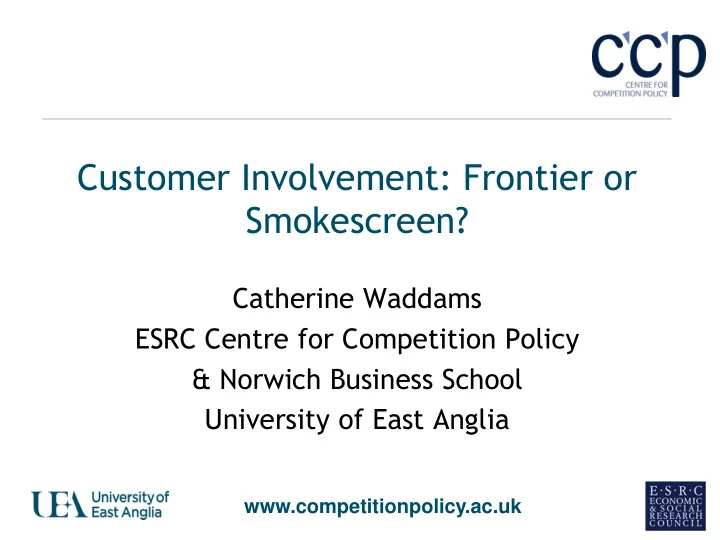

Customer Involvement: Frontier or Smokescreen? Catherine Waddams ESRC Centre for Competition Policy & Norwich Business School University of East Anglia www.competitionpolicy.ac.uk
Origins of Regulation Introduced because of monopoly power (and private ownership) Different issues according to: Whether customer has choice in the market (choice vs voice) Customer has some degree of countervailing power (some use of negotiated settlement)
Regulatory frameworks Is the regulator acting on behalf of customers? (primary duty protection of consumers UK legislation) Cust Co R If so, needs info about customer preferences, suggests internal body, advisory function
Regulatory frameworks Or is the regulator ‘refereeing’ between customers and companies (maximising total welfare/efficiency?) Cust Co R If so, customers external to regulator Statutory separate body, eg UK energywatch with strong arguments/authority from elsewhere
Regulatory frameworks Or does the regulator get in the way of legitimate relations between companies and customers? Cust Co R Should this be re-established, eg UK Ofwat Consumer Challenge Groups? What is the likely effect on R-Co relationship?
What problems can customer involvement solve? Asymmetric information for regulator (eg quality price trade off in networks) Asymmetric interest for salience • many small interests rather than one large one, collective action Asymmetric power • Deep pockets of monopoly vs miscellaneous concerns of consumers
Some awkward questions Who pays, does customer body need to demonstrate ‘eye - catching’ outcome? • What are the reasonable expectations? • Media/political pressures? How are interests of different customers balanced? Final consumers or all customers? Interests of ‘ average ’ or ‘ vulnerable ’ consumer? Will the squeaky wheel get the oil? How may companies try to influence if major players?
Is the customer always right? Individual valuations vary, not always consistent, even in simple markets eg energy retail with choice High consumer inertia, leave money on table Consumers make mistakes, lose money even when trying to save (Wilson and Waddams Price 2012) Consumers differ in attitudes, drivers for switching (Flores and Waddams Price 2013) But on average behave ‘rationally’ (Waddams Price, Webster and Zhu 2013)
Is the customer always right? Particular problems with low probability high cost events • eg disasters, relevant to robustness of networks Consistent group valuations almost impossible Fairness vs lowest aggregate price: social valuations – regulatory or political function? Does Consumer Challenge Panel address these issues, or present them to regulator to sort out? To be resolved separately for each industry or consistently across sectors?
Future vs present customers? Need for immediate results (current customers) always likely to be a danger Private discount rate (companies) likely higher than public (regulator) and customers (but companies seek assistance/reassurance for long term investment) New frontier: raises important issues, ‘empowers’ at least some consumer voice Smokescreen: doesn’t resolve them, & may raise new problems through rebalancing power/ changing narrative
Recommend
More recommend